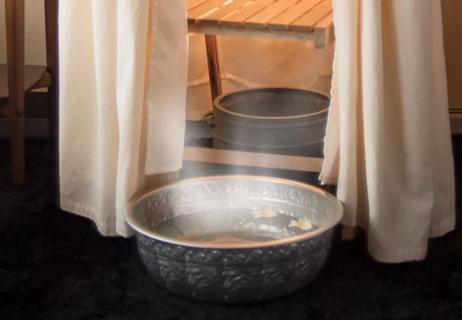A gynecologist shares what you can do (and what you can skip)

Sex, menstruation, pregnancy and childbirth. Your reproductive tract is a powerful part of your body.
Advertisement
Cleveland Clinic is a non-profit academic medical center. Advertising on our site helps support our mission. We do not endorse non-Cleveland Clinic products or services. Policy
While you may worry about keeping your vagina healthy and clean, the truth is, you don’t need to do much.
Ob/Gyn Oluwatosin Goje, MD, explains how to keep your vagina healthy and when you may need to pay a visit to your gynecologist. “Your vagina requires very little care, so less is more.”
Most people tend to use the term “vagina” to describe or talk about their genitals, including their vulva.
But what’s the difference?
Your vagina is the birth canal, connecting to your cervix.
Your vulva is the outside area of your genitals. This is the part you can see. It includes your clitoris, urethra and labia.
“Your vagina, which is pink in appearance, can’t be seen from the outside,” explains Dr. Goje. “Your vagina is characterized by its ability to change shape, which is most evident during childbirth.”
It’s important to understand the difference between your vulva and vagina because the cellular makeup of both is different. Some diseases are specific to your vagina or vulva.
Here’s how to keep your vagina in working order.
Eat right, control your weight and exercise.
“Not only is this good for your whole body; it’s good for your sexual organs, too,” says Dr. Goje.
Conversely, chronic conditions can put your genital organs at risk. For example, poorly controlled diabetes increases the likelihood of contracting yeast infections and urinary tract infections (UTIs).
Advertisement
Stay current with health screenings and see your gynecologist for routine care.
“Remember that screening intervals for Pap smears change based upon your age and Pap smear findings,” says Dr. Goje. “For younger individuals, HPV vaccination is especially important for reducing cervical cancer risk.”
It’s so important to protect yourself from sexually transmitted diseases like herpes, gonorrhea, chlamydia, syphilis and HIV, as well as any unplanned pregnancies.
“Insist on using condoms with any new sexual partner,” stresses Dr. Goje.
If your partner has a latex allergy, there are other condom options available.
The vagina is a self-cleaning organ. Using harsh chemicals, prepackaged wipes or douching can disrupt its normal process. If you must, a gentle soap is OK for your external genitalia.
Most products marketed to help you feel or smell cleaner aren’t backed by any scientific evidence and can lead to other problems.
“If you have particularly sensitive skin, also watch for soaps and shampoos you use in the shower,” advises Dr. Goje. “Even laundry detergents, dryer sheets and some lubricants can cause irritation.”
No need to primp and pamper your privates before your gynecologist appointment.
“Showering is all we expect and desire,” says Dr. Goje.
Coconut oil or olive oil may be preferred lubricants and vaginal moisturizers if you have sensitive skin or have multiple allergies. You can also use silicone or water-based lubricants as alternatives.
“They’re an option for those who aren’t using condoms,” says Dr. Goje.
If you’re using a latex condom, opt for water-based or silicone lubricants.
Postmenopausal bleeding is defined as vaginal bleeding that happens a year or more after your last menstrual period.
Postmenopausal bleeding can be a symptom of vaginal dryness, polyps (noncancerous growths), cancer or other changes in your reproductive system.
“If you ever experience bleeding after menopause, see your doctor for an evaluation,” recommends Dr. Goje.
Pelvic organ prolapse, where the internal supports of your uterus, vagina, bladder and rectum become weak over time, can be caused by vaginal deliveries and aging.
Another common issue is urinary incontinence, or bladder leakage.
Once diagnosed, these conditions only need treatment if they bother you — no need to treat them just because your gynecologist noted them during an exam.
“However, if you have trouble emptying your bladder or bowels or have pain or bleeding, it’s time to seek care,” says Dr. Goje.
Advertisement
Pelvic floor exercises, known as Kegels, can help, too.
As you go through menopause, it might be worthwhile to use a vaginal estrogen, which is available as a cream, tablet, capsule or insert.
“Vaginal estrogen can help prevent or reverse changes that occur with age like painful sex (due to thinning vaginal walls and less elasticity) and increased risk for UTIs [urinary tract infections] (due to pH changes as the vagina becomes less acidic),” says Dr. Goje.
While your vagina does a great job of keeping itself clean and healthy, you should see your healthcare provider if you notice any of the following:
Overall, your vagina doesn’t need much maintenance. “The vagina is like a self-cleaning oven when it functions properly,” says Dr. Goje.
Advertisement

Sign up for our Health Essentials emails for expert guidance on nutrition, fitness, sleep, skin care and more.
Learn more about our editorial process.
Advertisement

They have no proven benefits but can cause infection, damage your pelvic floor muscles and get stuck inside you

Choose 100% cotton (the best material for underwear) and put on a fresh pair (at least) daily

These herbal pellets aren’t backed by science and can be harmful

Instead of protecting you from infections, douching your vagina can do the very opposite

Most tears down there are mild and heal on their own, but some require medical treatment

This hot seat might be too hot to try

It’s important to angle it toward your rectum or back, along the natural curve of your vaginal canal

Even small moments of time outdoors can help reduce stress, boost mood and restore a sense of calm

A correct prescription helps your eyes see clearly — but as natural changes occur, you may need stronger or different eyeglasses

Both are medical emergencies, but they are very distinct events with different causes